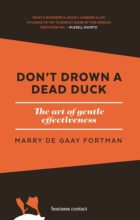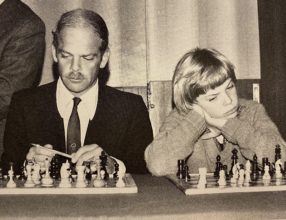By Tracy Metz
“With so many problems confronting us today, are we ready to turn to a different leadership model? And if so, what might it be?”
With this rhetorical question, Russell Shorto in his foreword sets the scene for the book to follow, Don’t Drown a Dead Duck: The art of gentle effectiveness by the prominent Dutch lawyer Marry de Gaay Fortman. In it she shares her quest as a woman at the top of her field for a path to successful leadership – and shares plenty of personal anecdotes and insights along the way.

A telling one is that as a girl, she was so good at judo that she played against the boys – until the sports teachers banned her because they thought the boys could not bear to lose to a girl.
Even with five sisters, there was nothing ‘girly’ about her upbringing, she writes, but she learned early on that the outside world didn’t always see her the same way. That was proven when she went to have a talk about becoming partner at the large law firm where she works, Houthoff. The first question was not how she saw her goals or her contribution as a partner, but rather how many more children she was planning to have. (She had one then, now four). Her answer was brilliant, and quick. Knowing that the partner interviewing her was about her age and had a child himself, she responded: “I have no idea, how many more children do you want?”
So what’s with the duck? That dead duck, Marry explains, is the thing you do not want to waste your energy on. She exhorts her (female) readers not to get caught up in pointless anger and negativity that only make matters worse, but rather to focus on the common goal or shared interest – all the time, of course, keeping your eye on the ball and not letting anybody eat the cheese off your bread, as the delightful Dutch saying goes. (That’s not in the book, but it seemed very apt to me). She calls that ‘getting to yes’. “Give the other person the benefit of the doubt, even if they don’t deserve it.”

Simultaneous chess match against former world champion M.M. Botvinnik, 1978. Left: father Bas de Gaay Fortman
‘Gentle effectiveness’ is clearly not easy. You have to repress your initial anger – Marry admits that she flies off the handle easily – and be to the point, casual and display no emotions, and not damage your opponent in public. The trick of staring down her opponent that she learned playing judo can come in handy too. And she knows from experience that saying what you support is much more effective that saying what you oppose. “People prefer a fixer to a naysayer.” And sometimes that smartest thing to do is to do nothing at all – just sit back and wait.
Shockingly enough, Dutch society is much less progressive than it looks. In 2017, only 6 percent (!) of the top 5.000 companies met the legal requirement since 2013 to have at least a third of their board members be women. (And, let it be noted, they were allowed to get away with it). In mid-2017, 70 percent of all large companies had any women on their boards at all. The share of women in science, technology. Engineering and maths is the lowest in Western Europe. In spite of the fact that more diversity in the labor market would increase the Dutch GDP by 17 percent. It’s not very Dutch to let an opportunity like that slip!

Marry with Masai women – Kenya, 2012
Russell Shorto analyses Marry de Gaay Fortman’s Dutch leadership strategy as a magic mix of her personal firmness and tenacity with the Dutch centuries’ long awareness of the importance of compromise, born out of the struggles against water from the Middle Ages. It’s a potent combination which has served Marry de Gaay Fortman well – as it will her readers.